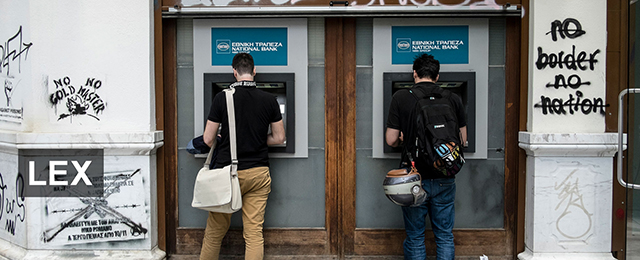Symbolic haircuts on collateral are possible, but any more funding pressure on the Greek banks is likely to force a collapse of the system.
The ECB understands this and is unlikely to make any moves that will tip the balance without a clear political will for Greece to leave the Eurozone. Looking back over the ECB’s rule book on ELA procedures, there seems to be a degree of flexibility in how it is interpreted.
The ECB must restrict ELA operations if the bank in question is insolvent or if it “interferes with the objectives and tasks of the eurosystem”, which we suspect gives the ECB room to manoeuvre around a set of rules that are really self-imposed and self-policed.
We would expect Draghi to steer the governing council in the direction of seeing the Greek banks’ difficulties as one of liquidity rather than solvency and not precipitate a euro exit via a collapse of the banking system. Until the referendum at least.
D-Day: 5th July referendum
Then we get to the referendum to be held on the 5th July. At this point it’s still unclear what the electorate will be asked to vote on. With the current bailout package due to expire on Tuesday, it’s a little difficult to vote on it (!).
The question could be phrased around the demands of the creditors or around euro membership. Clearly the phrasing will be important, particularly as the Greek constitution states that referendums should not be held on fiscal issues (although the wording of the constitution also seems to suggest that if the referendum is on a critical national issue rather than a serious social issue, the government could get around it).
How will the electorate vote? While the majority of Greeks support euro membership ‘at any cost’, support for Syriza remains strong, and they will actively campaign for a ‘No’ vote. Two polls in this weekend’s Greek press, put support for the Creditors’ offer at 57% for, versus 29% against, and 47% in favour, and 33% against. These polls suggest the ‘Yes’ vote will win through, but the questioning was conducted before the announcement of the referendum, and recommendation of their government was known.
If there is a yes vote: Clearly the government will have to respect the people’s wishes and sign a deal that would be close to the final creditor proposal. This will clearly provide some short term relief for the banks. But it is worth remembering that the creditor proposal was based on the provision of EUR15bn of funding in return for reforms. This would enable Greece to fund itself for five months. This is not a long term solution. But with a positive outcome in the referendum, it would suggest that the foundation is there for a longer term deal in November, based on the continuation of reforms, and possibly the offer of future debt relief. The major risk here is that if Syriza aggressively campaigns against the deal, they will have to step down, creating more political uncertainty, and if they stay in power there would be clear implementation risks. For the banks to become investable again we would want to see a strong bridge to a longer term deal and a stable political environment. Both are necessary to have medium term visibility into banks’ earnings.
If there is a no vote: Our strategists view this as the first step to an exit from the Eurozone:
“While Yanis Varoufakis has already claimed a ‘No’ result does not mean an exit from the euro, in reality it looks extremely difficult to reconcile such an outcome with continued euro membership, especially after the stance taken today by the ECB with respect to freezing the ELA. Further, the effectiveness of capital controls given Greece’s porous borders is questionable. To us, ‘No’ is highly likely to mean Grexit.”
For the banks, the first step in this process will be capital controls. A rigorous system of monitoring and enforcement will need to be put in place, particularly given the porous nature of the borders, otherwise the capital controls are significantly less effective. Once in place capital controls are very difficult to lift. The damage that is done to confidence in the banking system and the economy typically takes a long time to rebuild. In the case of Iceland, capital controls were only planned for a few weeks, at worst a month or two. In the case of Cyprus they were planned for four days. Capital controls in Cyprus lasted two years, and in Iceland 7 years.






Be the first to comment on "Tuesday unlikely to bring further changes for the Greek banks"